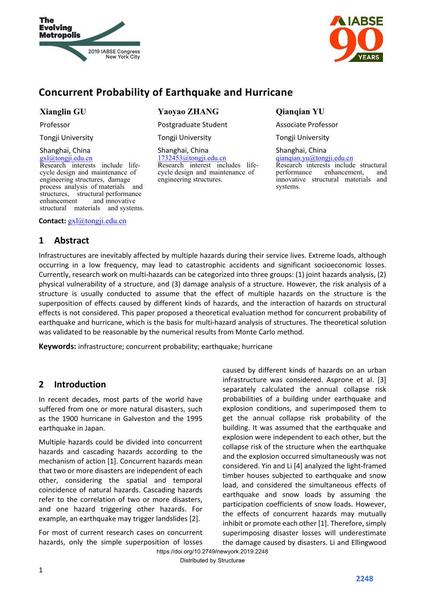Concurrent Probability of Earthquake and Hurricane

|
|
|||||||||||
Détails bibliographiques
| Auteur(s): |
Xianglin Gu
(Tongji University)
Yaoyao Zhang (Tongji University) Qianqian Yu (Tongji University) |
||||
|---|---|---|---|---|---|
| Médium: | papier de conférence | ||||
| Langue(s): | anglais | ||||
| Conférence: | IABSE Congress: The Evolving Metropolis, New York, NY, USA, 4-6 September 2019 | ||||
| Publié dans: | The Evolving Metropolis | ||||
|
|||||
| Page(s): | 2248-2252 | ||||
| Nombre total de pages (du PDF): | 5 | ||||
| DOI: | 10.2749/newyork.2019.2248 | ||||
| Abstrait: |
Infrastructures are inevitably affected by multiple hazards during their service lives. Extreme loads, although occurring in a low frequency, may lead to catastrophic accidents and significant socioeconomic losses. Currently, research work on multi-hazards can be categorized into three groups: (1) joint hazards analysis, (2) physical vulnerability of a structure, and (3) damage analysis of a structure. However, the risk analysis of a structure is usually conducted to assume that the effect of multiple hazards on the structure is the superposition of effects caused by different kinds of hazards, and the interaction of hazards on structural effects is not considered. This paper proposed a theoretical evaluation method for concurrent probability of earthquake and hurricane, which is the basis for multi-hazard analysis of structures. The theoretical solution was validated to be reasonable by the numerical results from Monte Carlo method. |
||||
| Mots-clé: |
tremblement de terre
|
||||
